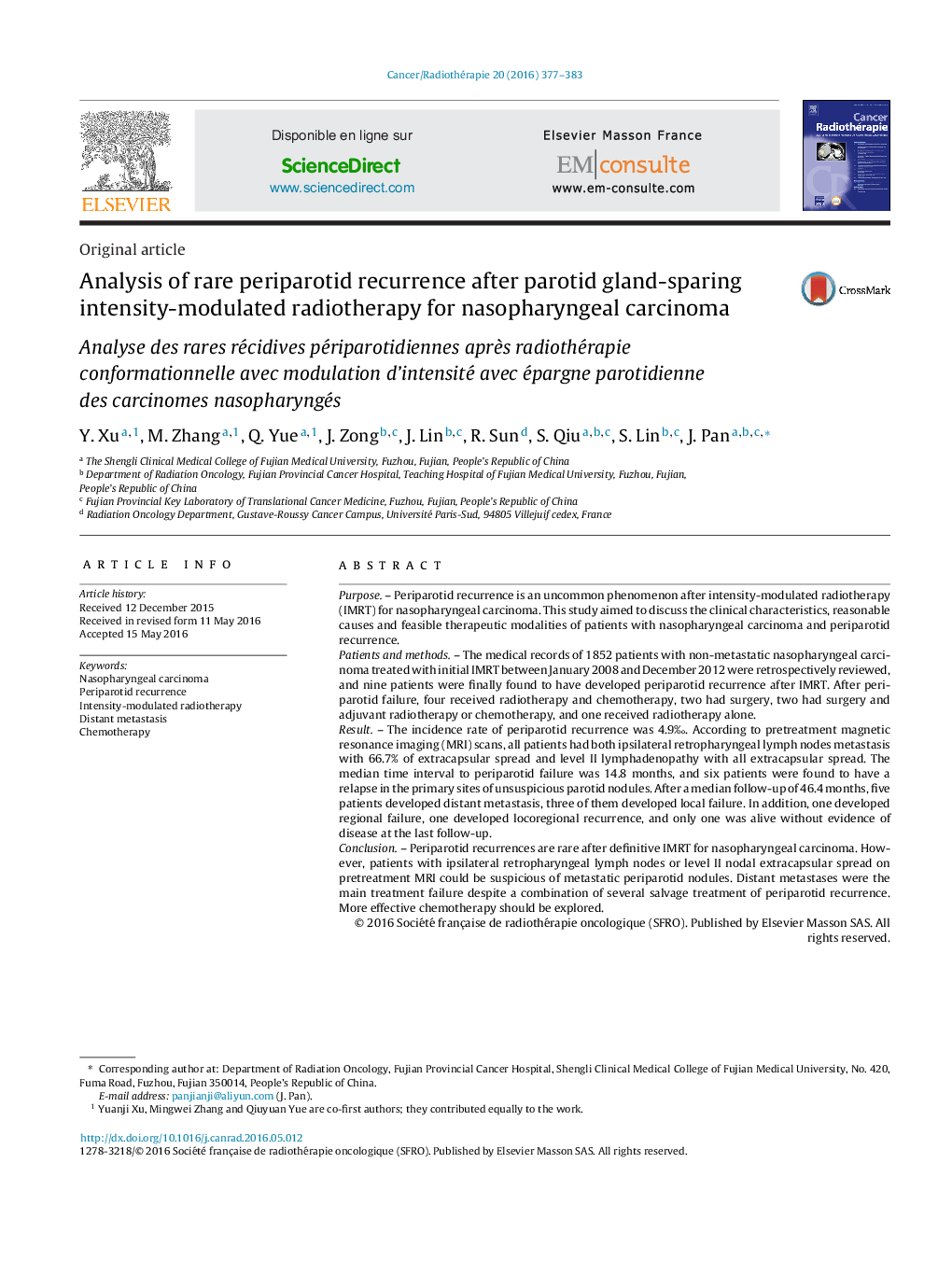| کد مقاله | کد نشریه | سال انتشار | مقاله انگلیسی | نسخه تمام متن |
|---|---|---|---|---|
| 2116964 | 1401505 | 2016 | 7 صفحه PDF | دانلود رایگان |
PurposePeriparotid recurrence is an uncommon phenomenon after intensity-modulated radiotherapy (IMRT) for nasopharyngeal carcinoma. This study aimed to discuss the clinical characteristics, reasonable causes and feasible therapeutic modalities of patients with nasopharyngeal carcinoma and periparotid recurrence.Patients and methodsThe medical records of 1852 patients with non-metastatic nasopharyngeal carcinoma treated with initial IMRT between January 2008 and December 2012 were retrospectively reviewed, and nine patients were finally found to have developed periparotid recurrence after IMRT. After periparotid failure, four received radiotherapy and chemotherapy, two had surgery, two had surgery and adjuvant radiotherapy or chemotherapy, and one received radiotherapy alone.ResultThe incidence rate of periparotid recurrence was 4.9‰. According to pretreatment magnetic resonance imaging (MRI) scans, all patients had both ipsilateral retropharyngeal lymph nodes metastasis with 66.7% of extracapsular spread and level II lymphadenopathy with all extracapsular spread. The median time interval to periparotid failure was 14.8 months, and six patients were found to have a relapse in the primary sites of unsuspicious parotid nodules. After a median follow-up of 46.4 months, five patients developed distant metastasis, three of them developed local failure. In addition, one developed regional failure, one developed locoregional recurrence, and only one was alive without evidence of disease at the last follow-up.ConclusionPeriparotid recurrences are rare after definitive IMRT for nasopharyngeal carcinoma. However, patients with ipsilateral retropharyngeal lymph nodes or level II nodal extracapsular spread on pretreatment MRI could be suspicious of metastatic periparotid nodules. Distant metastases were the main treatment failure despite a combination of several salvage treatment of periparotid recurrence. More effective chemotherapy should be explored.
RésuméObjectif de l’étudeLa récidive périparotidienne est un phénomène rare après la radiothérapie conformationnelle avec modulation d’intensité (RCMI) des carcinomes nasopharyngés. Cette étude visait à examiner les caractéristiques cliniques, les causes potentielles et les modalités thérapeutiques possibles pour la prise en charge des carcinomes nasopharyngés avec récidive périparotidienne.Patients et méthodesLes dossiers de1852 patients atteints de carcinome nasopharyngé non métastatiques, pris en charge par RCMI entre janvier 2008 et décembre 2012, ont été rétrospectivement revus. Neuf patients ont vu se développer une récidive périparotidienne. Parmi ces patients, quatre ont été pris en charge par radiothérapie et chimiothérapie, deux par chirurgie, deux par chirurgie et radiothérapie adjuvante ou chimiothérapie, et un exclusivement par radiothérapie.RésultatLe taux de récidive périparotidienne était de 4,9 ‰. Sur les IRM faites avant le traitement, tous les patients étaient atteints à la fois de métastases ganglionnaires rétropharyngées homolatérales (dont 66,7 % avec envahissement extracapsulaire) et dans l’aire II, avec envahissement extracapsulaire. L’intervalle de temps médian jusqu’à la récidive périparotidienne était de 14,8 mois, et six patients avaient été atteints de récidives dans des nodules parotidiens présents initialement et considérés comme non suspect. Après un suivi médian de 46,4 mois, cinq patients ont vu se développer des métastases à distance, trois de ces patients étaient atteints de récidive locale. Par ailleurs, un patient était atteint de récidive régionale et un de récidive locorégionale. Seulement un était en vie sans signe de maladie au dernier suivi.ConclusionLes récidives périparotidiennes de carcinome nasopharyngé sont rares après une RCMI. Cependant, les patients atteints de métastases ganglionnaires rétropharyngées homolatérales ou dans l’aire II homolatérale avec envahissement extracapsulaires sur l’IRM faite avant le traitement pourraient être atteints de nodules métastatiques périparotidiens. Les métastases à distance étaient la principale cause d’échec du traitement malgré la conjugaison de plusieurs traitements de sauvetage des récidives périparotidiennes. L’utilisation de chimiothérapies plus efficaces devrait être explorée.
Journal: Cancer/Radiothérapie - Volume 20, Issue 5, July 2016, Pages 377–383
